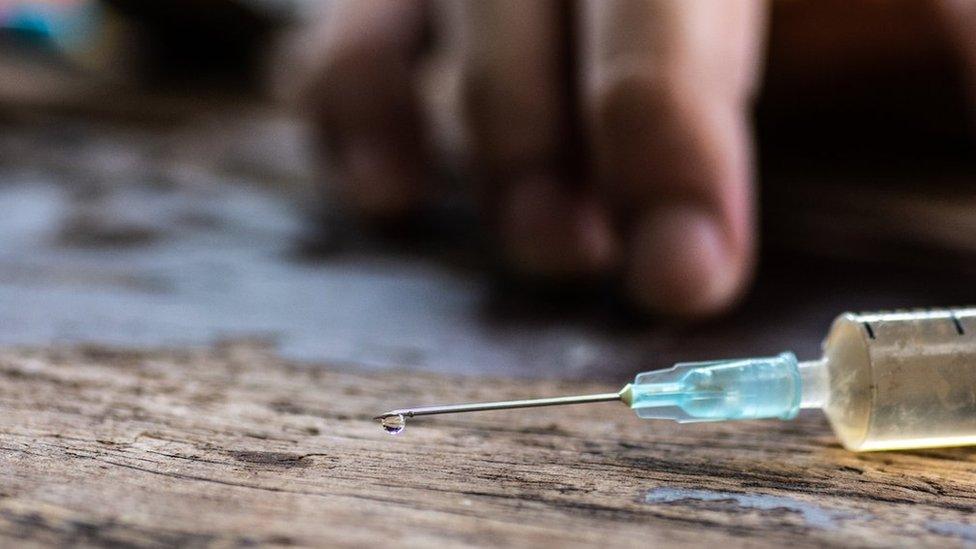No prosecution plan for drug consumption rooms
- Published
- comments
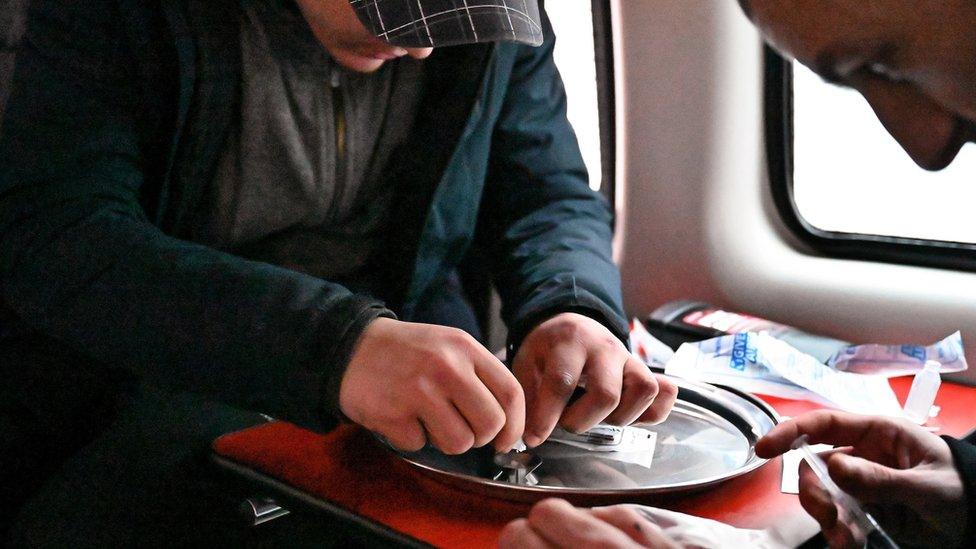
A Westminster committee has backed calls for drug consumption rooms to be trialled in Scotland
Scotland's chief law officer has said it would not be in the public interest to prosecute users of drug consumption rooms for simple possession offences.
The move could help pave the way for such facilities to be established despite opposition from Westminster.
Drugs law is reserved to the UK government but Scotland has some leeway in setting its own prosecution rules.
Lord Advocate Dorothy Bain KC said she would be prepared to publish such a policy, if she was asked to do so.
In a statement she added: "It does not amount to an exclusion zone whereby a range of criminality is tolerated."
Scotland continues to have the worst drug death rate in the UK and the rest of Europe, although the latest figures showed some progress.
Drug consumption rooms - facilities where people can inject drugs under supervision - have been advocated by campaigners as a harm reduction measure as part of a wider strategy.
According to studies, they can reduce overdose deaths, public injecting and drug-related litter, while a range of bodies and health experts - including the Royal College of Physicians of Edinburgh - have backed previous Scottish proposals.
The Home Affairs Committee at Westminster recently recommended that the Misuse of Drugs Act (1971) be amended to allow a pilot project to run in Scotland.
But the call was swiftly rejected by the Home Office.
On Monday a spokeswoman said: "There is no safe way to take illegal drugs, which devastate lives, ruin families and damage communities and we have no plans to consider this."
The Scottish Conservative leader Douglas Ross said he did not believe drug consumption rooms were the answer, but said he was happy for a range of options to be looked at.
He said: "We still have significant reservations about the effectiveness of consumption rooms, but the SNP now have no excuses not to take this action that they have been demanding for so long."
Mr Ross, who is promoting a Right to Recovery Bill at Holyrood which focuses on access to treatment, said Scotland's drug-death rate remained a "national emergency".

Scotland's 'unofficial' drugs consumption room
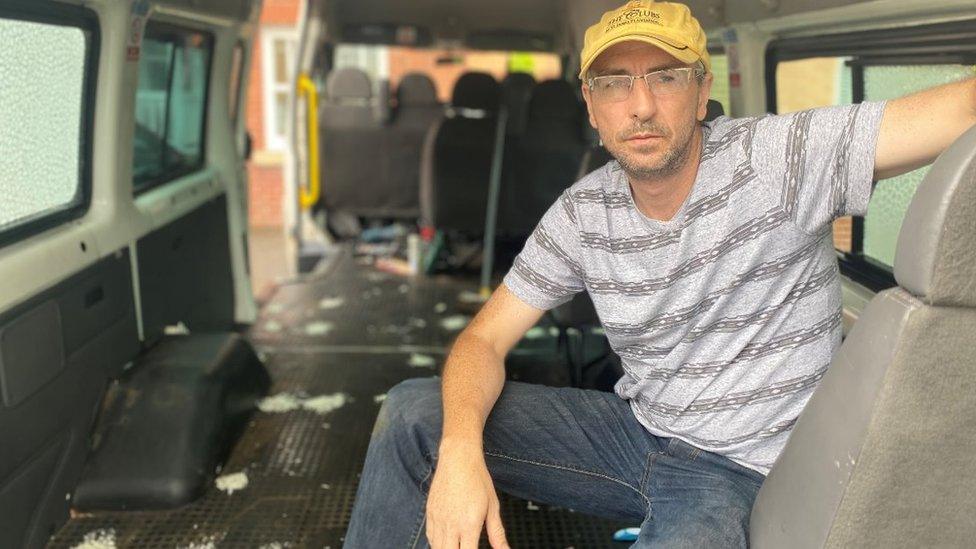
Peter Krykant converted an old van into a "safe space" for users to take their own drugs
An unofficial pilot of a drugs consumption room in Glasgow has already taken place.
Frustrated by delays and deadlock, campaigner Peter Krykant set up his own facility in the back of a van in September 2020.
Every Friday he would park up in Glasgow city centre, offering drug users a well-lit space where they could inject with sterile equipment and safe syringe disposal facilities.
The van was also equipped with naloxone, a drug that could reverse an overdose and a defibrillator.
Initially police took a relaxed approach - but after two months he was arrested, accused of obstructing officers who wanted to conduct a search.
The case never came to court because the Crown dropped the charges, and the van continued to operate for a full year.
An academic study, external later concluded that 894 supervised injections had taken place and there had been nine successful interventions involving an overdose.
Peter Krykant later told the BBC how various pressures contributed to his own relapse into Class A drug use after 11 years of being free from the habit.
He also spoke of difficulties getting the help he needed in Scotland, and how a "Good Samaritan" paid for him to attend a treatment facility in England.

First Minister Humza Yousaf urged the UK government to look at the "really strong evidence base" for piloting a safer drugs consumption facility.
He told BBC Scotland News: "It's not a silver bullet, it's one tool that we can use to help us deal with the drugs death issues that we have here in Scotland."
Scotland's Drugs and Alcohol Policy Minister Elena Whitham said the Lord Advocate's statement removed an obstacle to establishing the first official Safer Drug Consumption Facility in the UK.
The minister has been examining plans for a pilot project developed by Glasgow City Health and Social Care Partnership (HSCP) and Police Scotland, facilitated by the Scottish government.
Ms Whitham said those plans could now be presented for approval to the Glasgow City Integration Joint Board - which brings together council and health officials.
She added: "While the service would still be limited to some extent, due to the reserved Misuse of Drugs Act, we are confident it would save lives.
"We know from evidence from more than 100 facilities worldwide that Safer Drug Consumption Facilities work. It is now time to see this approach piloted in Scotland."
Police Scotland Assistant Chief Constable Gary Ritchie said the force was committed to working in partnership to reduce the harm associated with problematic substance use and addiction.
He added: "Our approach to any initiative aimed at tackling these harms will be to establish how best policing can support it within the confines of the law.
"It is important to note that existing legislation will not be changing and, while we may take an overall supportive policing approach, police officers will still be bound by their legal duty to uphold the law and will not be able to simply ignore acts of criminality which they see occurring."
Shortly after Dorothy Bain's appointment as Lord Advocate in 2021, she announced that people caught with Class A drugs such as heroin for personal use in Scotland could be dealt with by means of a police warning rather than prosecution.
Last year the number of people who died due to drug misuse in Scotland fell by 279, the lowest level for five years.
Figures from National Records of Scotland show 1,051 people died of drug misuse in 2022.
Related topics
- Published31 August 2023
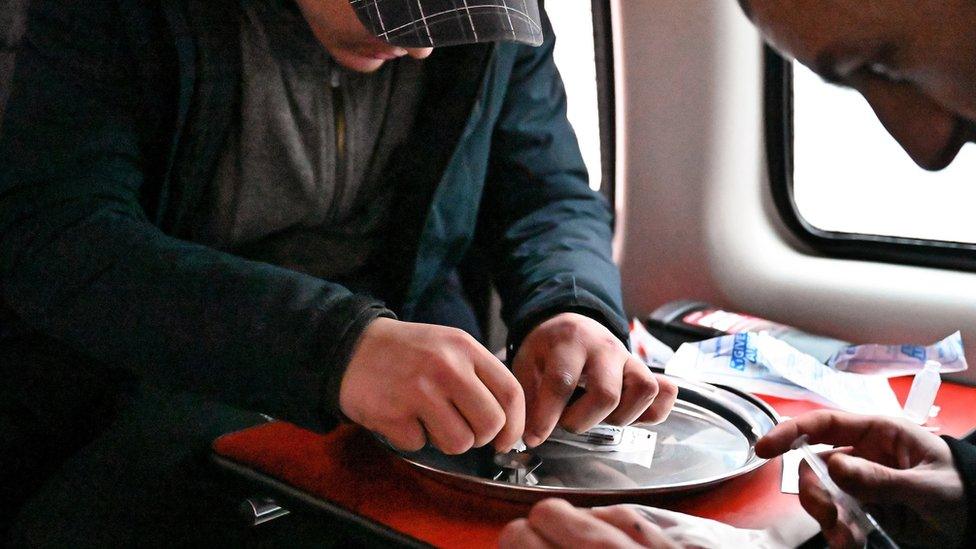
- Published31 August 2023
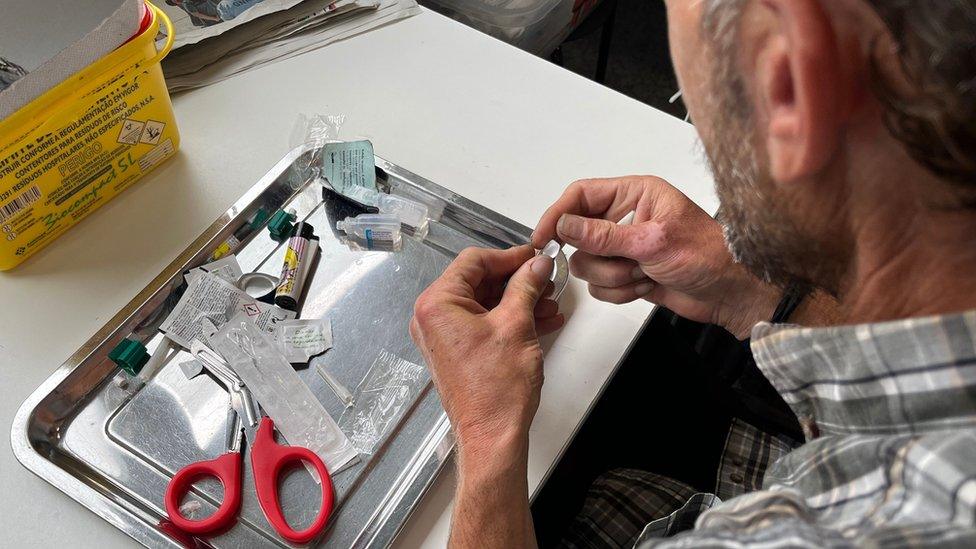
- Published22 August 2023
